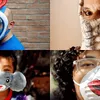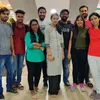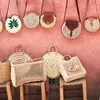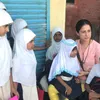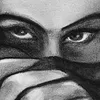Creativity and resilience: curator Shyamala Ramanand moves the Akanksha exhibition online, promotes 60 artists
In a two part photo essay on this annual art exhibition, we showcase a range of creative works along with curator and artist insights.
Launched in 2014, PhotoSparks is a weekly feature from YourStory, with photographs that celebrate the spirit of creativity and innovation. In the earlier 495 posts, we featured an art festival, cartoon gallery,. world music festival, telecom expo, millets fair, climate change expo, wildlife conference, startup festival, Diwali rangoli, and jazz festival.

This month, artist and curator Shyamala Ramanand’s annual art show 'Akanksha' is being held entirely online. See Part I, Part II, and Part III of our coverage of the 2019 edition at Karnataka Chitrakala Parishath. One of Shyamala’s earlier exhibitions was titled '50 Shades of Black and White' (see our photo essay here).
Titled Akanksha Art 2020: Online Women’s Group Show, its artist lineup includes Ambica V, Anagha Deshpande, Asha Vivek, Bijee Thomas, Bipasha Samanta, Christine Borgohain, Malini Menon, Mitali Mishra, Neetha Prabhu, Pramila Das, Priya Ramanathan, Sana S, Shaleena Nair, Shana Gokul, Sharmila P, Shobha Iyer, Shobha Shanbagh, Tiby Manu, Vedha Sreeram, and Veena Devagiri.
Shyamala Ramanand
“Due to COVID-19, our physical exhibition this year got cancelled. We were quite perturbed about not having a show at all this year, so we struck upon this idea of taking the show digital,” Shyamala Ramanand explains in a chat with YourStory.
Interestingly, this also led to having a permanent place for the artists to display their works for the world to see, she adds. “Having an exclusive website for self-taught artists was always on my mind since the last few years, but I kept postponing it,” she explains.
More inspiration to go digital came during a talk at the 2019 edition of her show, by the guest of honour — Sanjay Sahay, Additional Director General of Police, Karnataka Police Computer Wing. He spoke on the potential of digital technology combined with the art to create a global showcase, Shyamala recalls.
Construction of the website began during the lockdown, and it now features 430 works by 61 artists, she proudly says. She created the website largely by herself, with some background tech support. It caters to self-taught and upcoming artists in India.
The message to artists this year was direct, “Present your creations which kept you going in these troubled times.”
“Artists have been voraciously painting away in the last six months since the lockdown began, and this has kept them going. I think once the pandemic gets over, we are going to have show after show coming up,” Shyamala predicts.
The artworks exhibited online range in price from Rs 1,000 to Rs 90,000. “Both the options of unframed and framed artworks are available,” she adds.
“In facing a pandemic of this magnitude, coming together and seeking connection is more important than ever before. The chaotic and traumatic life-altering events have overwhelmingly touched every aspect of human life today,” Shyamala laments.
“In these situations, everyone, everywhere in the world is thinking everyday about how human beings are going to win this World War III,” she evocatively describes. This is a war with an unknown enemy that can be won only by the concerted actions and full participation of nations, individuals, and cultures, she adds.
“Art can give people hope and imagination, and the feeling that we are surrounded by many others too,” Shyamala says. Unfortunately, the art world has been particularly hard hit since many people consider art to be a luxury segment.
“History has shown that the best of creations have come out during crises, including earlier pandemics. It may be a moment of physical distancing, but truly not social distancing as humankind has understood that art can bind us, and assures us that this connect will sustain,” Shyamala affirms.
She also offers words of advice for aspiring artists. “Work consistently and passionately: that is the only mantra now. This isolation has actually been beneficial in some ways by leading to more introspection. I see many artists have rediscovered themselves in these times, and it’s a very reassuring sign,” Shyamala observes.
Shobha Iyer
The crisis has made artists even more aware of art and its contribution to our well-being, explains Shobha Iyer, an artist with 10 years of experience. Momentary joys, even during the lockdowns, often come through pure and collective expressions of artistic minds.
“The art industry, which operates exclusively from public spaces is scrambling to reinvent itself virtually. It was a challenge to learn how to move exhibitions and competitions online,” she says. It calls for patience, but can also be an enriching experience.
Shobha is grateful to the online opportunity that Akanksha offers as an affordable art platform for emerging artists. Her paintings are priced from Rs 2,500 Rs 40,000.
One of her artworks is titled Escape, and is based on a challenge given by her daughter to create a painting based on a photograph she gave. In addition to renditions of real life, Shobha is also working on forms like Kerala murals, which call for a patient and peaceful mind.
“When creative minds are behind locked doors, our souls expand to express more through art. We should use the time to learn what scares us but not let the negative energy affect us. Expand your creativity and let it flow,” Shobha advises aspiring artists.
“Patience and perseverance are the most important while learning a skill. Never stop learning,” she adds.
Malini Menon
The pandemic is a time to dig one’s heels in and refuse to succumb to panic and confusion, according to Malini Menon. “Art is a soothing balm that helps divert the mind to the pleasanter aspects of life, and creates a calm and happy frame that can boost immunity,” she says.
She interprets the pandemic as nature's way of setting things right. “This shakeup was imminent,” Malini observes. It has led people to spend more time with each other, and artists can actually benefit from much more global exposure online.
For the exhibition, she prepared realistic works created with soft pastels, which she discovered two years ago. “I want to be known for being a pet artist,” she says, referring to her works featuring labradors.
Malini advises aspiring artists to learn from online videos, and have loads of practice. “We are so blessed that technology has made life so much easier. Each day brings new experiences, new lessons, and fresh ideas,” she enthuses.
“Above all, remain humble. Remember, it's an ocean out there. Despite five years of getting into serious art, the lapping waves have just about curled around my toes. I probably may need several lifetimes to be able to actually swim in it,” Malini poetically explains.
Asha Vivek
As a counteractive effect of having to stay at home, people are now finding the time to really admire the art around them, observes Asha Vivek. “The digital platform is helping artists reach the masses now more than earlier. The pandemic indirectly paved a way for numerous people to rekindle their passion for art, as a new skill, or just as a stress-buster,” she observes.
Though initially morose when the pandemic broke out, and upset with the constant bad news, she kept painting. “This reminded me that my world was always within me and my art. Art was always my salvation and it proved to be so again,” Asha affirms. Based in Bengaluru, she was the former General Secretary of the Coimbatore Art Foundation.
It was hard for her to give up teaching her classes on oil painting for a while, but this gave time to explore and dive into newer subjects and techniques. “During the lockdown, I was introduced to the online art community via Instagram,” she recalls. The Akanksha exhibition gives the opportunity to reach a wider audience from the comfort of home.
For the exhibition, she prepared a series called Timeless, with leaves in opposing colour palettes. “The black and white piece depicts the monochrome that our lives have become, with monotonous days that are indistinguishable from one another,” Asha explains.
“The monochrome then transitions gradually into a brighter spectrum of green as though saying that time always heals,” she adds. Another work called Challenge features a deserted boat in a vast ocean, reflecting the alienation that we all now feel.
The painting Frozen Moments is also accompanied by the warmth from the warm colour palette. “All my works depict nature, which we all seem to be gravely missing right now since we have to stay indoors,” Asha says.
She advises students and aspiring artists to always have a work of art up on their easel. “There is nothing like your artwork in plain sight, pushing you to keep at it every day, even for a limited period of time,” she recommends.
It helps to experiment with techniques and mediums to see what yields satisfaction and happiness. “Don’t pick a subject for its complexity, but rather try your hand at things that bring you joy. Your resultant artwork will improve your technique,” Asha emphasises.
Mitali Mishra
Art played an important role in society during the pandemic – people had more time to explore their creativity while staying at home, according to Mitali Mishra. “Many of my friends held pencils and brushes after 15 to 20 years, and started enjoying it. Art helped to keep us cheerful during this hard time,” she says.
After travels to Sweden and Pondicherry this January, she found it difficult to stay confined to her home. There was less stock of materials accessible during the lockdown. “But this period gave me an opportunity to improve my graphite work,” Mitali says. For the Akanksha exhibition, she prepared paintings on Lord Ganesha, and a watercolour titled Gronsaker.
She also started online classes for children. “Online teaching was not easy at first, but slowly I started enjoying it. The online platform has given us a wider spectrum,” Mitali explains. She has a background in computer science and HR as well.
She reminds aspiring artists that there is no alternative to hard work. “Learning art is a long process, practice is the only way to success. The online platform helps us to learn art independent of location,” Mitali suggests.
“COVID-19 has brought the art community together and closer. So never look back and just go with the flow,” she advises. She also urges a greater spirit of giving, to help one another. Another development she applauds is the National Education Policy’s treatment of art.
Shobha Shanbhag
“Art is an excellent stress buster which brings people joy. It is a creative form that does not necessarily require formal training,” says Shobha Shanbhag. It is possible to paint directly with fingers and even vegetables and fruits, she jokes.
“The possibilities are endless. Many people who earlier said they didn't have it in them to create art are beginning to explore their creative side without inhibitions during the pandemic,” she observes.
The pandemic also changed her perspective about learning art through an online platform. “While I did struggle to adapt initially in the portrait painting class, I am now getting used to virtual learning,” Shobha says.
She was also able to complete her unfinished artworks since she was always at home. “I try to update my Instagram feed weekly. The likes and comments I receive motivate me to do more,” she enthuses.
For the exhibition, she prepared works inspired by the colours of nature. “I wanted to inculcate a sense of calm during these times of COVID, where our state of mind is very fragile. Hence, I chose the colour blue as a theme,” Shobha explains.
“Each one of us has an innate artistic ability. It just needs to be tapped,” she advises audiences. She recommends that aspiring artists invest lots of time to polish skills, learn new art forms, research different artists, and try to finish old artworks.
“Be it sketching, understanding tonal values, creating abstracts, painting realistic landscapes, making mandalas, or learning zentangles or realistic portraits – just pick up your paintbrush and fire away,” Shobha urges.
Veena Devagiri
As an art teacher, therapist and counsellor, Veena Devagiri advises people to just play with colours during these times of crisis and depression. “Art plays a major role in expressing hidden emotions. Patience is necessary, and once you are occupied with any type of creative activities, you will forget the world,” she advises.
Veena has donated two of her paintings for auction, as aid to help during the pandemic. “I have accepted this crisis as a great opportunity to prove myself. I am enhancing my knowledge by attending online classes,” she says.
“There is a lot to learn in art, there is no end to learning, it is a vast subject. I feel that I am just learning the letter A of ART,” Veena evocatively explains. She also tried her hand in sculpting to make eco-friendly statues of Lord Ganesha.
Veena has participated in many virtual exhibitions and learnt a lot from established artists, including ways of using social media platforms to market creativity. “The Akanksha platform came as an oasis in the desert,” she enthuses. “Art is everything for me, it has given me name and fame. I still have lots of dreams to catch,” she adds.
Veena prepared works titled Curiosity (where a boy is peeping through a broken door to see how the pandemic has paused the world), Love and Compassion (with a sadhu sharing his alms with a kid goat; a lady feeding a monkey), Prayers (for strength to overcome the crisis), and Unconditional Love (while feeding children).
She offers suggestions for aspiring artists as well. “Don’t compare your work with others, be unique. Just listen to your mind, be your own critic. Study the work of great masters to get ideas, not to copy them. Imitating others blocks your creativity and innovation,” she advises.
“Don’t worry about whether your art will be sold, just build your style, and take inspiration from nature. Never quit practicing art,” Veena urges.
P. Sharmila
Art can be a source of inspiration or motivation, or a window to a free soul, according to P. Sharmila. She senses diverse perspectives and desires emerging from people during the tough times of the pandemic.
“Art is an exercise to the mind, it takes me away from constant reminders of the corona crisis in the media. The isolation actually allows me to attain peace with solitude,” she adds. However, going out or even procuring art materials has been a challenge.
During the lockdown, Sharmila attended a number of online workshops. “I was able to broaden and improve my skills in the comfort of my home, and take part in online exhibitions,” she says.
For this exhibition, she showcased her works based on nature, titled Misty Trail, A Walk in the Forest and Morning Freshness. The messages based on freedom were intended to be a contrast to the confinement during lockdown, she says.
She also offers tips for aspiring artists. “Be inspired even by the smallest details. With an open mindset, you can boost your imagination,” Sharmila signs off.
Now, what have you done today to pause in your busy schedule and find new ways of exploring your creative core despite these hard times?
















See also the YourStory pocketbook ‘Proverbs and Quotes for Entrepreneurs: A World of Inspiration for Startups,’ accessible as apps for Apple and Android devices.
Edited by Suman Singh




